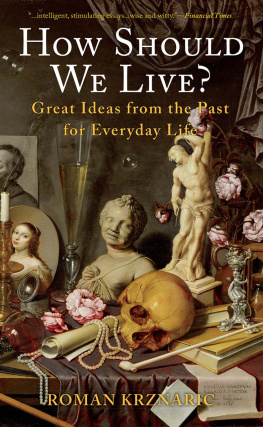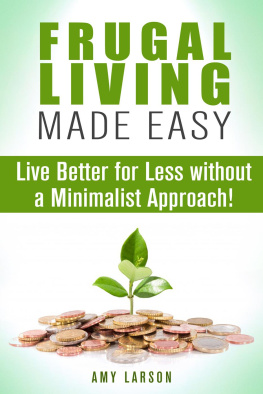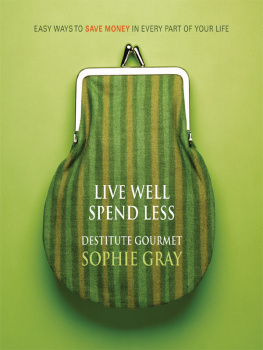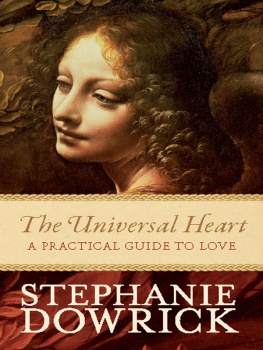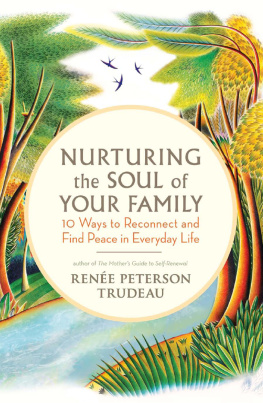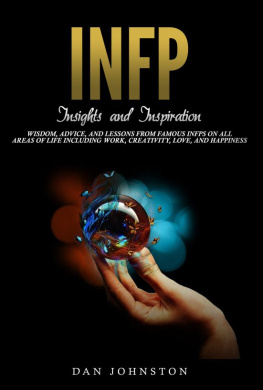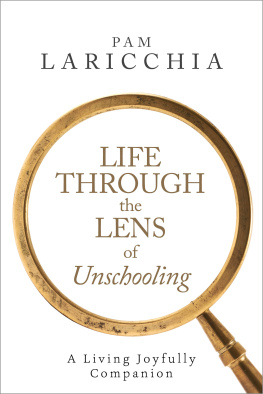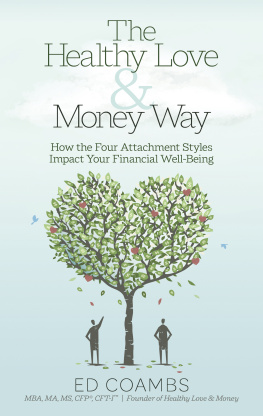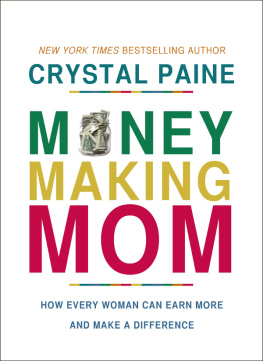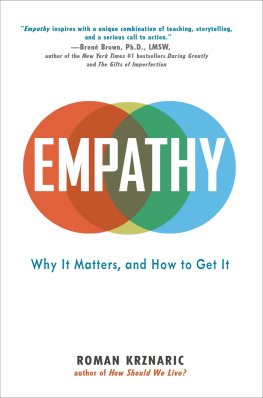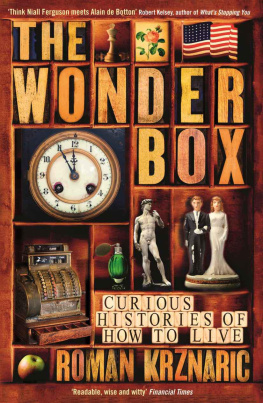
Copyright Roman Krznaric, 2011
All rights reserved. No part of this book may be reproduced or transmitted in any form or by any means, electronic or mechanical, including photocopying, recording, or by any information storage and retrieval system, without permission in writing from the Publisher.
Published in Great Britain under the title
The Wonderbox by Profile Books Ltd
Published in North America in 2013 by
B l u e B r i d g e
An imprint of
United Tribes Media Inc.
Katonah, New York
www.bluebridgebooks.com
ISBN: 9781933346847
Library of Congress Control Number: 2013950240
Jacket design by Angel Guerra Cover art: David Bailly (15841657). Vanitas. Self portrait of the artist, still life.
Stedelijk Museum de Lakenhal, Leiden, The Netherlands. Photo Credit: Erich Lessing / Art Resource, NY
Printed in the United States of America
10 9 8 7 6 5 4 3 2 1
CONTENTS
Index
He who cannot draw on three thousand years is living from hand to mouth.
Johann Wolfgang von Goethe
PREFACE
How should we live? This ancient question has a modern urgency. In the affluent West, society is changing faster than we can adjust to it. Online culture has transformed how we fall in love and nurture our friendships. The demise of the job for life, and rising expectations of finding work that broadens our horizons as well as pays the bills, have increased our confusion about choosing the right career. Medical progress has given us longer lives than ever before, and we are left wondering how best to spend the precious extra years we have been granted. Ecological crises are posing new challenges for ethical living, from where we take our vacations to how we think about our childrens future. Moreover, the quest for consumer pleasures and material wealth, which obsessed us during the twentieth century, has left many yearning for deeper forms of fulfilment and meaning. How to pursue the art of living has become the great quandary of our age.
There are many places to begin looking for answers. We can turn to the wisdom of philosophers who have grappled with the questions of life, the universe and everything. We might follow the teachings of religions and spiritual thinkers. Psychologists have developed a science of happiness, which offers clues for shaking us out of old habits and maintaining a positive outlook on life. Then there is the advice of self-help gurus, who often deftly wrap all these approaches into a five-point plan.
Yet there is one realm where few have sought inspiration for our dilemmas about how to live: history. I believe that the future of the art of living can be found by gazing into the past. If we explore how people have lived in other epochs and cultures, we can draw out lessons for the challenges and opportunities of everyday life. What secrets for living with passion lie in medieval attitudes towards death, or in the pin factories of the Industrial Revolution? How might an encounter with Ming-dynasty China, or Central African indigenous culture, change our views about bringing up our kids and caring for our parents? It is astonishing that, until now, we have made so little effort to unveil this wisdom from the past, which is based on how people have actually lived rather than utopian dreamings of what might be possible.
I think of history as a wonderbox, similar to the curiosity cabinets of the Renaissance what the Germans called a Wunderkammer. Collectors used these cabinets to display an array of fascinating and unusual objects, each with a story to tell, such as a miniature Turkish abacus or a Japanese ivory carving. Passed down from one generation to another, they were repositories of family lore and learning, tastes and travels, a treasured inheritance. History, too, hands down to us intriguing stories and ideas from a cornucopia of cultures. It is our shared inheritance of curious, often fragmented artefacts that we can pick up at will and contemplate in wonder. There is much to learn about life by opening the wonderbox of history.
We will be guided on our journey by a host of famous and sometimes forgotten figures. They will escort us into unusual territory the invention of the department store or the myth of the five senses. Their task will be to reveal the extraordinary variety of ways that human beings have approached crucial matters such as work, time, creativity and empathy. Our guides will help us question our current mode of living, and offer surprising and practical ideas for taking our lives in new directions.
The principal and proper work of history, wrote the seventeenth-century thinker Thomas Hobbes, is to instruct, and enable men by the knowledge of actions past to bear themselves prudently in the present and providently in the future.ideas for dealing with the predicaments of living in the Western world today. While these scholarly studies have rarely been written with this pragmatic project in mind, they are bursting with insights for those who desire to lead a more adventurous and purposeful life. Just as the Renaissance rediscovered the lost knowledge of classical antiquity and revolutionised the arts and sciences as a result, we must unearth the hidden ideas for good living that have been buried for so long in the past, and create a revolution of self-understanding.
Learning from history is, on one level, about identifying the most compelling of our ancestors ways of living and adopting them ourselves. Yet it is also about recognising the many ideas and attitudes that we have often unwittingly inherited from the past. Some of these are positive and should be welcomed into our lives, such as the view that immersion in the wilds of nature is essential to our wellbeing. But we have been bequeathed other cultural legacies that could be doing us enormous harm, yet which we scarcely spot or question, such as a work ethic in which we consider leisure time as time off rather than time on, or the belief that the best way to use our talents is to become a specialist in a narrow field a high achiever rather than a wide achiever. We need to trace the historical origins of these legacies which have quietly crept into our lives and surreptitiously shaped our worldviews. We may choose to accept them, understanding ourselves all the better for it, or we may reject them and cut ourselves free from an unwanted inheritance, ready to invent anew. That is the sublime power we wield when we have history in our hand.
All history is written through the eyes of the author, who filters the past by selection, omission and interpretation. This book is no exception. It does not cover the entire history of love, money or any other aspect of the art of living. Instead I draw on those episodes which seem to illuminate well the life struggles that many of us face on a daily basis. In the chapter on family, for instance, I concentrate on the history of the househusband and family conversation, partly because they give insights into difficulties Ive had in my own life. My choices of historical focus are not, however, primarily personal, and reflect a judgement of what may be most useful to people who feel perplexed or just plain curious about how to live, and who have the space and opportunity in their lives to make changes.
The following pages are a homage to Goethes credo He who cannot draw on three thousand years is living from hand to mouth. I examine the last three millennia of human history, from the ancient Greeks to the current day. While looking mainly at Europe and North America, I also turn to other areas of the globe for inspiring approaches to the good life, including Asia, the Middle East, and amongst indigenous peoples, whose contemporary cultures often reflect ancient ways of being.
Next page
